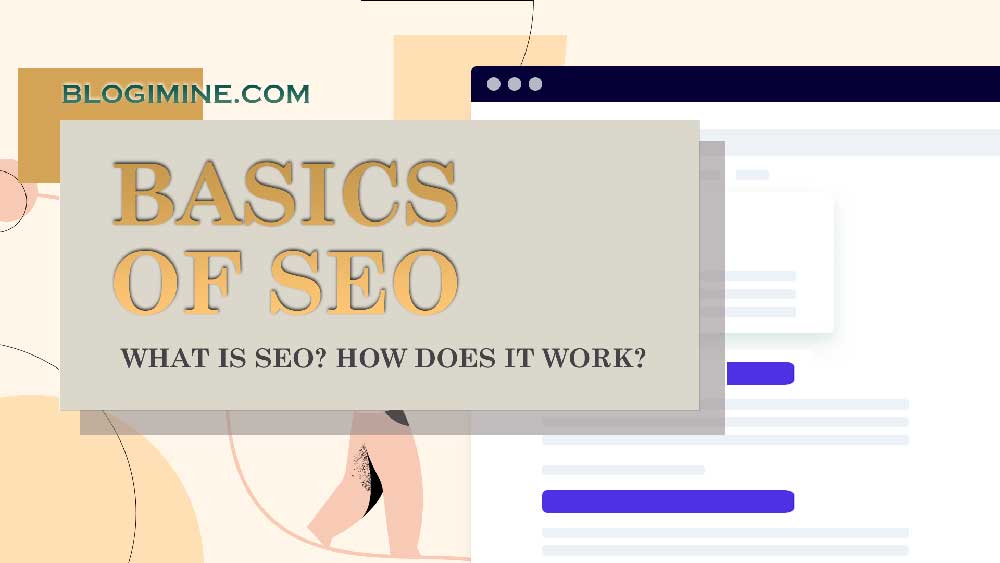
The Basics of Search Engine Optimization (What is SEO):
Search engine optimization (SEO) is a process used to increase the visibility of a website or web page in search engine results. It involves optimizing the content, structure, and performance of a website to make it more attractive to search engines.
SEO can be used to target specific keywords and phrases, improve user experience, and boost website rankings in search engine results pages (SERPs). One of the main goals of SEO is to increase organic traffic to a website. Organic traffic is the number of visitors who come to a website from unpaid search engine results. This type of traffic is important because it is more likely to convert into sales or leads than paid traffic. SEO involves optimizing both on-page and off-page elements. On-page optimization includes optimizing content, titles, Meta tags, headings, and other elements that appear on the page itself.
Off-page optimization involves building links from other websites to your own. This helps search engines understand that your website is relevant and trustworthy. SEO is important for businesses because it helps them reach more potential customers. It also helps them rank higher in search engine results pages, which can lead to more organic traffic and increased visibility for their brand. Additionally, SEO can help businesses save money by reducing their reliance on paid advertising campaigns.
How does SEO work?
SEO, or search engine optimization, is the practice of optimizing your website and its content to improve website visibility and ranking in search engine results pages (SERPs). SEO works by helping search engines understand what your website and its pages are about, so they can show them to people who are searching for information related to your content.
Here are some of the key elements of SEO and how they work:
- Keyword research: One of the first steps in SEO is to identify the keywords and phrases that people use to search for content related to your website. By targeting these keywords in your content, you can improve your chances of appearing in relevant search results.
- On-page optimization: This involves optimizing your website‘s pages for specific keywords and making sure that your content is easy for search engines to crawl and index. This can include things like optimizing title tags, meta descriptions, and header tags, as well as improving page speed, using schema markup and ensuring that your site is mobile-friendly.
- Content creation: Creating high-quality, informative, and engaging content that answers the questions and satisfies the needs of your target audience can help improve your website’s visibility and ranking. This includes creating blog posts, videos, infographics, and other types of content that are optimized for your target keywords.
- Link building: Building high-quality backlinks to your website can help improve your authority and visibility in search results. This involves getting other websites to link back to your site, which can be done through tactics like guest blogging, broken link building, and influencer outreach.
SEO is a complex and constantly evolving field, and it requires a combination of technical and creative skills to be successful. By understanding how SEO works and implementing best practices, you can improve your website’s visibility and attract more organic traffic over time.
Why SEO is Important:
SEO is an essential component of digital marketing, as it helps businesses improve their online visibility and reach a larger audience. By optimizing their website for search engines, businesses can improve their search rankings, which lead to more organic traffic to their site. Higher rankings also increase credibility and trust among potential customers, resulting in increased engagement and ultimately, more conversions. With millions of websites on the internet, SEO helps businesses stand out from the competition and attract a more qualified audience. Therefore, businesses that invest in SEO are better positioned to succeed in today’s digital landscape.
SEO is important for several reasons:
- Visibility: Search engines are the primary way people find information online, so optimizing your website for search engines can improve your visibility and reach a wider audience.
- Credibility: When your website appears at the top of search engine results pages, it can help establish your credibility and authority in your industry or niche.
- Traffic: By appearing higher in search results, you can attract more organic traffic to your website, which can lead to more conversions, sales, or other desired outcomes.
- Cost-effective: Compared to other marketing strategies, SEO can be a cost-effective way to attract high-quality traffic to your website. While it may take time and effort to see results, the long-term benefits can be significant.
- Competitive advantage: If your competitors are also investing in SEO, not optimizing your website can put you at a disadvantage. By staying on top of SEO best practices and continually improving your website’s visibility, you can stay ahead of the competition and attract more customers or clients.
What is More Impact full – SEO or SEM(Paid Marketing):
SEO and SEM (paid search) are both important components of a comprehensive digital marketing strategy, and each has its own advantages and limitations. One key advantage of SEO is that it can generate long-term results with consistent effort, as it focuses on improving the website’s organic search ranking. It does not require any additional cost per click or impression, which makes it a cost-effective strategy over time.
On the other hand, SEM or paid search can deliver faster results and offers more control over the targeting of the audience, ad placements, and ad content. It is particularly useful for businesses looking to quickly generate traffic and leads, especially in a competitive market.
However, the cost of paid search campaigns can be high, and it requires constant investment to maintain the flow of traffic. Paid search ads can also be perceived as less trustworthy compared to organic search results, which may not be as effective in building brand credibility and trust in the long run. Overall, both SEO and SEM have their benefits and limitations, and a balanced digital marketing strategy that leverages the strengths of both approaches can help businesses achieve their marketing objectives effectively.







